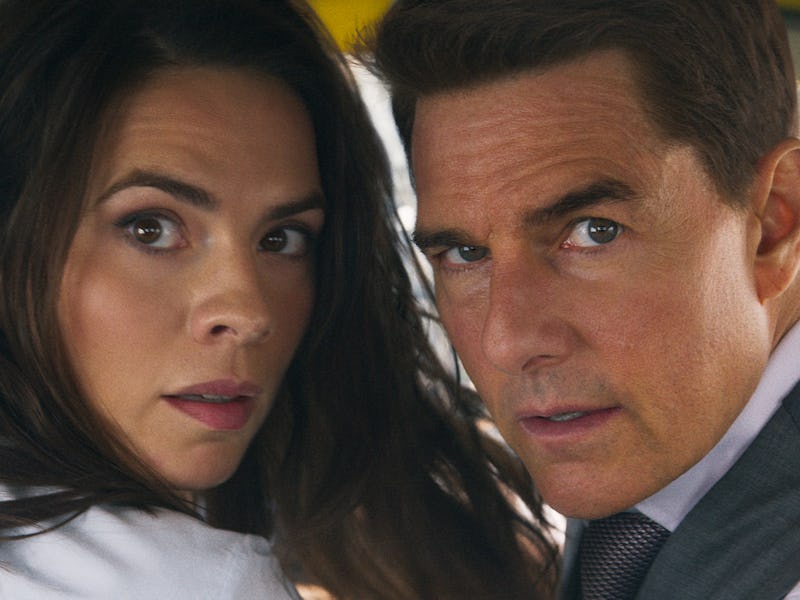Mission: Impossible 7 Relies Too Much on the Franchise’s Greatest Weakness
Plot doesn’t matter in most movies, but especially the Mission: Impossible films.

By all accounts, Mission: Impossible – Dead Reckoning Part One is already shaping up to be another massive success. One of this summer’s biggest titles, the film has received overwhelmingly positive reviews and seems primed to be the only major live-action action movie of its kind this year. To its credit, Dead Reckoning Part One delivers just as many thrills, chills, and “wow” moments as many of its franchise predecessors, too.
However, the film does fall a bit shy of the mark set not only by 2018’s Mission: Impossible – Fallout, but also 2015’s Rogue Nation and 2011’s Ghost Protocol. That’s because, for as many death-defying, perfectly staged stunts as it has to offer, Dead Reckoning Part One leans more heavily on its plot than any other Mission: Impossible movie. And as beloved as the franchise is, there’s no denying that its world-ending conflicts have never been its most compelling elements.
On the contrary, most of the Mission: Impossible movies of the past have worked in spite of their plots, many of which have felt loosely stitched together by the flimsiest of threads. Despite that fact, Mission: Impossible — Dead Reckoning Part One puts its humanity vs. AI plot front and center, which is why it makes the kind of mistakes that its most recent predecessors have avoided.
Mission: Impossible — Dead Reckoning Part One makes an unfortunate mistake.
Nobody would go so far as to call the plots of any of the past Mission: impossible movies “simple.” They did, however, all stick close to a familiar formula, and they have all wisely kept their conflicts fairly vague. Solomon Lane (Sean Harris) wanted money to keep his Syndicate, a collection of rogue international operatives, funded. August Walker (Henry Cavill) wanted to buy three nuclear bombs so he could use them to upset the established world order. Neither of these goals are all that complicated or specifically drawn, and that doesn’t matter.
The plots of both Mission: Impossible — Rogue Nation and Fallout are nothing more than vehicles for Tom Cruise’s Ethan Hunt to get from one set piece to another. Why do he and August Walker perform a HALO jump in Fallout? Because they have to get to Paris as quickly and covertly as possible. That’s basically it, and because the jump itself is so awesome, you don’t question whether or not it was really necessary for Ethan to do it. Dead Reckoning Part One, conversely, goes out of its way to explain why Ethan needs to pull off each stunt, even when — as it does in the film’s third act — that means sidelining him for certain periods of time.
The new movie has a point it wants to make about humanity’s responsibility when it comes to AI, and its themes are admirable. They’re even in keeping with the analog obsession that Tom Cruise has injected into every one of his late-career action movies. However, the film overcomplicates its plot and focuses on its details so much that it not only retroactively writes a new origin story for Ethan Hunt, but also introduces a new archnemesis and fills itself up with more supporting characters than it knows what to do with (see: Shea Whigham’s Jasper Briggs).
Mission: Impossible — Dead Reckoning Part One is a flawed, often stunning cinematic achievement.
At their best, Dead Reckoning Part One’s numerous enemies and plot threads give it an overstuffed but screwball edge. At their worst, they force the film to keep jumping between multiple points of view and subplots even when it would be in Dead Reckoning Part One’s best interest to slow down. That’s especially true of the second-act death of Ilsa Faust (Rebecca Ferguson), which is revealed and then moved on from so quickly that it’s never given the attention or weight it deserves.
Her death, as well as the film’s all-too-brief mourning of her, feels strikingly similar to the way Avengers: Endgame treats the death of Black Widow (Scarlett Johansson), another fan-favorite heroine who dies in service of a lesser-loved character (in this case, Hayley Atwell’s Grace). Mission: Impossible — Dead Reckoning Part One is, to be clear, a far more technically impressive film than Endgame. On its own, it’s an unbelievable technical achievement.
By giving itself more plot than it’s able to fit into one movie, though, Dead Reckoning Part One ends up relying too much on what has always been the weakest aspect of the Mission: Impossible franchise.
Mission: Impossible — Dead Reckoning Part One is now playing in theaters.
This article was originally published on